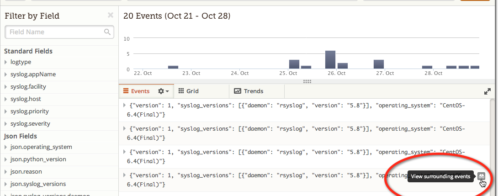Loggly Introduces Second-Generation Cloud-Based Log Management Service
New service focuses on visual analysis of massive volumes of operational log data. Stakes claim to Responsive Log Management™ approach.
San Francisco, Calif. — September 3, 2013 — Loggly, the world’s most popular cloud-based log management service released a new generation of its platform today, establishing new benchmarks for ease-of-use, scalability and visual analytics. At a time when cloud-centric organizations are eager for better tools to derive real-time insight from the enormous volume of operational management data generated daily by business applications and IT infrastructure, Loggly has staked out a new path. Called Responsive Log Management™, Loggly’s approach enables developers and technical operations teams to solve problems faster.
The all-new “Generation 2” service features a new user interface, new analytical tools and a scaled-out architecture to handle large customer needs. Important new capabilities include point-and-click trend graphs from any data, automated event parsing, powerful search and filtering capabilities, a spreadsheet-like grid view option, integrated alerting, customizable dashboards and persistent workspaces that allow users to pick up just where they left off if even if they restart their browser or switch to an alternate computer. Notably, Loggly has dramatically simplified the process of getting logs to Loggly which does not require proprietary software agents to be installed. Loggly also today launched a new website and added new pricing plans to accommodate a diverse customer base.
Loggly targets “cloud-centric organizations”. These include both pure-play Internet companies as well as divisions of large diversified businesses, who conduct their business primarily over the Internet including e-commerce, gaming, social-media, mobile, digital advertising, SaaS and the like. Whether they build their infrastructure “on-prem” or in the cloud, because they do business over the ‘net they eagerly embrace cloud-based services for many of their important needs. By clearly identifying who it serves, Loggly is able to tune its product offerings to very specific needs.
With Loggly Gen2, the company is also staking out a new path in log management known as Responsive Log ManagementTM or RLM. The three principles of the RLM product strategy are: Simplicity, Scalability and Stories. Simplicity means that the service should be immediately useful and valuable without training and then advanced features reveal themselves through use. Scalability means that the service must be able to accommodate highly dynamic volumes and be especially tolerant of data spikes. Stories mean that the service should not simply be a tool to inspect log data but rather should reveal the stories that the data tells. The stories are visual representations that provide insights in and of themselves as well as provide fine-pitch guidance as to where to focus further investigative effort.
As a SaaS offering, Loggly is especially convenient and practical. Customers gain the reliability of an always-on redundant platform and rapid functional advancement. And customers do not have to manage large analysis clusters, keep up with software updates, or expend human and capital resources on activities that are not their core business focus.
Loggly Gen2: Foundations
Loggly’s new platform builds on the experience of servicing 3,500 existing customers day in and day out. It has been architected for exceptional user experience, reliable data ingestion, processing, and analysis. Highlights of the architecture include:
A rich web-based application designed with a user-first perspective. Significantly, Loggly envisioned the entire user experience and designed every page, form, dialog and button at the very earliest stage of the effort. The aim was to ensure that the entire system was created in service of the user experience and manifests so users can explore log data, visually without complex commands.
A unique design utilizing extraordinarily efficient and robust ingestion components that can run at line speed. These lay the foundation for the highly scalable system.
A patent-pending layered data architecture that enables hierarchical data analysis for trending purposes.
Integration of proven open source technologies, including ElasticSearch, Apache Lucene 4, Apache Kafka from LinkedIn, and Storm from Twitter;
Deployed as a hybrid of Amazon Web Services and our own infrastructure, to deliver high availability and resiliency to network or infrastructure problems, wherever they occur;
Loggly’s RESTful API allows developers to integrate the service with other operational systems and processes;
“Our new release represents an entirely unique approach to log management,” said Jim Nisbet, Vice-President of Engineering and CTO at Loggly. “Cloud-centric organizations are demanding a rock-solid architecture so they always have real-time access to critical truths in the logs, regardless of their location or origin.”
“Log data is foundational,” said Harper Reed, former CTO at Obama for America. “The ability to immediately understand how infrastructure is performing at any given time is critical. While I didn’t always like what Loggly was telling me, I’m sure happy it did.”
“Loggly streamlines our issue detection process by letting us concentrate on the issue rather than on which server is causing it, which is invaluable when you run a geographically distributed infrastructure,” said Valentino Volonghi, Chief Architect at AdRoll.com.
“Log management is the first big data problem that every cloud-centric organization must tackle,” said Charlie Oppenheimer, CEO of Loggly. “Our second generation service delivers improved speed, scale and a world-class user experience to allow our customers to solve problems faster and predict where new issues will arise.”
About Loggly
Loggly is the world’s most popular cloud-based log management solution, used by more than 3,500 happy customers to effortlessly spot problems in real-time, easily pinpoint root causes and resolve issues faster to ensure application success. Founded in 2009 and based in San Francisco, the company is backed by Trinity Ventures, True Ventures, Matrix Partners, Cisco, Data Collective Venture Capital and others. Visit the Loggly website: www.loggly.com. Follow @Loggly on Twitter.
###
Media contact:
Kevin Wolf
TGPR
650-327-1641
kevin@tgprllc.com
David Ewart
Loggly
dave@loggly.com
The Loggly and SolarWinds trademarks, service marks, and logos are the exclusive property of SolarWinds Worldwide, LLC or its affiliates. All other trademarks are the property of their respective owners.
Hoover J. Beaver

![]6-Criteria-for-finding-log-based-management-solution blog header](https://www.loggly.com/wp-content/uploads/2017/05/BLOG-1500x7006-Criteria-for-finding-log-based-management-solution-498x196.png)
